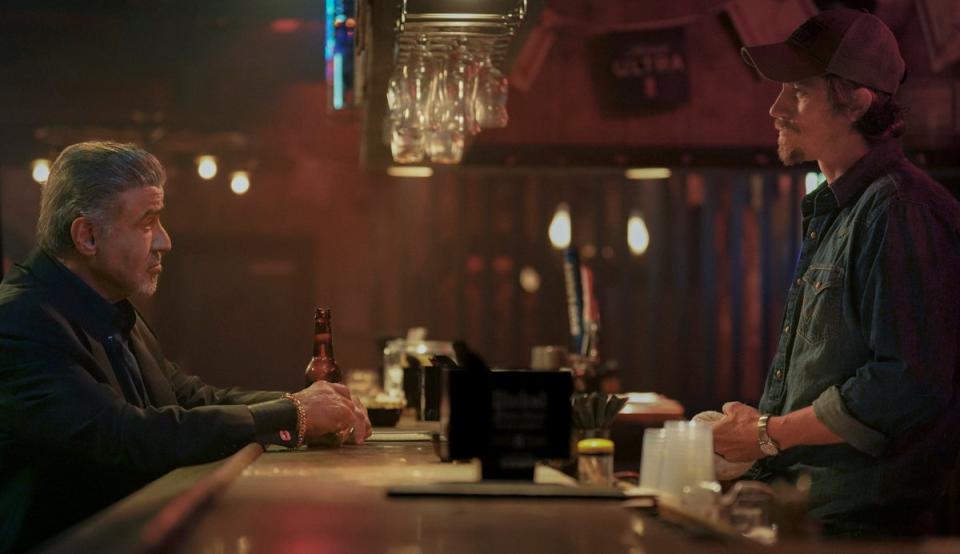Tulsa King on Paramount+ review: this is Stallone dialled up to 11

Remember Netflix’s first ever original show? From all the way back in 2012? It was called Lilyhammer and starred Steve Van Zandt as a New York gangster relocating to a small town. Van Zandt’s small town was in Norway rather than Oklahoma. He had relocated because he’d turned informant, not because a new gen capo had banished him having finished up 25 years in jail. But other than that, the inverse Midnight Cowboy premise of Tulsa King – put streetwise metropolitan outlaw in nowheresville, allow culture clash hilarity to ensue – is pretty much the same, except on Paramount+.
Twenty-five years is a long time. Twenty-five years ago, had Sylvester Stallone’s agent uttered the words, “Hey, how about a TV series?” he probably would have got whacked. For ages now, of course, everybody has done TV. Even Arnie signed up for a Netflix show two years ago, but then his two attempts to reboot his most famous franchise (Terminator) for a new generation both flopped.
For Sly, however, both Creed films, though, were roaring successes: to the extent that he bagged his second ever Oscar nomination for his reprisal of Rocky. Now though, a “regretful situation” (read: some Hollywood asshole fucked him over on his rights) has forced him out of the franchise he famously created from scratch in just three days, all those years ago. So now Sly becomes the last of the action heroes to migrate to streaming’s big bucks.
Stallone’s Mafia capo is called Dwight Manfredi: a ridiculous name, but probably still not as ridiculous as Marion Cobretti from Cobra, which Stallone wrote and starred in back in 1986. During his time in prison Manfredi tells us, via an introductory voiceover, that he “read a lot of books”.
Maybe so. But he apparently did not look at a newspaper, or watch any television, or movies, or imbibe any kind of cultural or socio-political change over the previous quarter of a century. So he has no idea what Uber is. He doesn’t know you can now buy marijuana legally. He isn’t aware that ‘gangster’ now means ‘amazing’. Or that young Americans all talk in, like, questions?

Anyone coming to Tulsa King expecting gritty, prestige TV realism or Sopranos-style depths of character is going to be disappointed. Sylvester Stallone knows what he is good at, what people want from him: and that is not ‘a different side’ or ‘a nuanced portrayal’, or whatever.
Thus by the end of episode one’s 45 minutes, he has punched two guys hard in the face, another in the testicles and knocked another clean out using only a steel water bottle. He swaggers around a Tulsa in which a 74-year-old man - albeit a handsome 74-year-old man in a nice suit - can walk into a dive bar and, one shot of bourbon later, have a beautiful woman at least 25 years his junior invite him to join the hen do she is on, then ask him if he fancies taking her back to his hotel room.
Those punches, too, are shot in such a bouncy, cartooney, macho sort of a way that you half expect Batman-style POWs to flash up each time. The dialogue is often risible. And the peripheral characters really put the ‘peripheral’ into ‘peripheral characters’.
But the truth is that none of this matters. This is Stallone dialled up to 11, exhibiting the kind of towering, megawatt, likeable-and-funny-even-when-he’s-knocking-someone-out charisma that time has forgotten, but he hasn’t.
Perhaps Tulsa King is enjoyable because it acts as a reminder that – in a year that has brought us a boring series about Uber, a boring series about WeWork and a really boring series about Spotify – larger-than-life gangsters doing gangster stuff in nice suits while hurling around large wads of cash will just always be more compelling than people in hoodies doing coding and blathering on about crypto.
Tulsa King is streaming now on Paramount+

 Yahoo News
Yahoo News 
